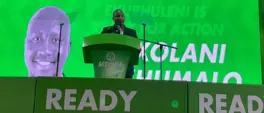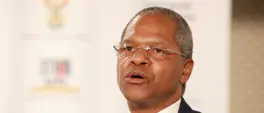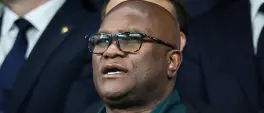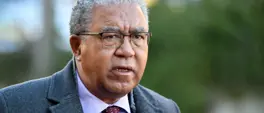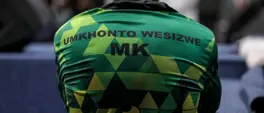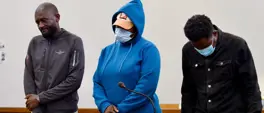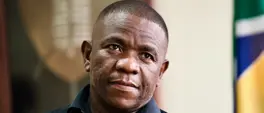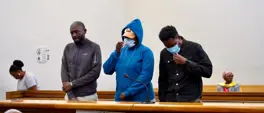Survivor shares her story: 'I'd even written the letters for my kids... there is hope.'
Tasleem Gierdien
19 September 2025 | 18:15Warning: this article contains discussions of suicide and depression. Discretion is advised.

If you are struggling with mental health, reach out to a trusted friend, family member, or contact the South African Depression & Anxiety Group (SADAG) on 0800 567 567.
You are not alone.
On Kfm 94.5's The Flash Drive, Carl Wastie heard Mathilda's story and chats to Roshni Parbhoo-Seetha, SADAG's Project Manager: Education.
Listen below:
September is globally recognised as Suicide Prevention Month.
It's a crucial time to raise awareness, reduce the stigma surrounding mental health, and promote life-saving resources.
Key events within the month include World Suicide Prevention Day on 10 September, and 988 Day on September 8th, which serve as focal points for action and conversation about suicide prevention.
The month emphasises that mental health is a vital aspect of overall well-being, and access to care is essential for everyone.
That's why Carl heard from Mathilda who shared her story...
Carl shared that he met Mathilda after dropping off a cheque she won on radio from a competition.
Upon meeting, Mathilda shared what a huge moment this was for her because she tried to take her life in 2021, three times over a six-week period.
This is her story...
"I had walked out of an 18-year abusive marriage and all of a sudden I was a single mother with three children. I had moved into my mom's place. I was in therapy at the time. Wounds were being opened that I had forgotten about... so, I had felt that instead of the therapy helping, it was making me feel worse – which now I know is part of the process, but at the time it didn't feel that way. I started feeling like a burden to my kids, to my mom, and at work. I was at my lowest at the time... I'd even written the letters for my kids to explain why I did it and put out what I wish for them going forward in life in these letters."
- Mathilda
"I didn't see the day after tomorrow, there was no tomorrow, next week, it was never planned. Every attempt that I took was an impulsive attempt... although, I had written the letters to the kids... my first attempt was on the 18th of February. When I woke up that morning, I never thought this is the day I'm going to try and commit suicide, but as the day prolonged and just not feeling good about yourself, circumstances, and everything... by the time the end of the day approached, I was on lithium tablets at the time, I took as many as I could with the hope of not waking up the following day or not waking up at all."
- Mathilda
"The same happened with the second and third time. I remember, the second time, I was home alone and an overwhelming amount of sadness and loneliness took hold of me and in that moment, I took every tablet I could find lying around – also with the hope of not waking up again. After the third attempt when I saw my psychiatrist, he said to me, 'don't you think you've got a bigger purpose in life? You've tried three times and you failed three times, there must be something bigger for you.' Even him saying this at the time, didn't make me feel better – but after the third time, there was a mindset shift that took place and that gave me hope, not immediately... because I lost my job, the place we were staying at, I was at my lowest and a dear friend said to me, 'things can only get better, it can't get worse when you're at you're lowest... so, focus on the next five minutes, then make it 10 minutes, and you go on and as you go along, you'll survive the day and then another...' and that's what helped me."
- Mathilda
Mathilda also explained how she dealt with suicide survivor's guilt...
"The guilt didn't come immediately, it was more a feeling of why didn't this work when I've tried so many times, what is my purpose, where am I supposed to be going... this friend was available for 24 hours and she's also a qualified counsellor and she would sit with me and we would talk on the phone and she would just help me get through what I was going through... that is how I slowly but surely climbed out of a dark hole by the support I was given from her and knowing that at any point, she will be there and take my call and if she can't, she'll call back but her being there and her being the support system I had helped – and later the guilt came of how can you do that to your kids? But that's where therapy again stepped in and helped to deal with that guilt, because it helped me realise that it wasn't about them, it was about where I was and what I was going through... it wasn't me trying to hurt them, it was me wanting to give them a better life not having a mother depressed constantly... I felt like I wanted to protect them from that."
- Mathilda
Mathilda credits her journey to recovery to therapy...
"It's very important, I probably would not have come as far had it not been for therapy. I still go for therapy. I am at a good place in my life but even on a good day, there's nothing wrong with having that support and to talk... the minute you start voicing things helps you move forward. Often we go through stuff and we bottle things up and sometimes bottling up makes things worse – part of me getting to my lowest point was not speaking about things. It played a big role in my recovery and having a friend who is a counsellor being available 24/7 saved my life."
- Mathilda
Roshni Parbhoo-Seetha, SADAG's Project Manager, says we need more survivors like Mathilda to share their story, which can be a beacon of hope to others struggling alone.
"When someone has attempted suicide, it's often surrounded by shame, secrecy and stigma... when survivors share so openly it helps us to normalise those conversations about mental illness, and it encourages others to seek support without that fear of judgement. It also creates that connection and hope for those that are struggling so when they hear someone who has walked a similar path, they realise they're not alone and can get through it... there is hope."
- Roshni Parbhoo-Seetha, Project Manager - SADAG
"So many more survivors need to speak up because telling one's story can be a healing process to others who are struggling alone."
- Roshni Parbhoo-Seetha, Project Manager - SADAG
"We should talk about it throughout the year... we need to realise that many people need to talk about it because not talking about it makes things worse. That silence only reinforces that isolation so many people feel... so days like this on the mental health calendar need to be commemorated more than just once a year."
- Roshni Parbhoo-Seetha, Project Manager - SADAG
Parbhoo-Seetha explains how we can assist those close to us who might be struggling with their mental health...
"We know our loved ones and best friends the best, so we know when their moods are changing, we know when their behaviours are changing... we can pick it up so trust your gut. The one question we are afraid to ask is: 'are you thinking of hurting yourself.' That's the one question we think is too triggering to ask – ask the question. I think we're afraid of the answer, what will happen when a friend says, 'yes.' What do you do? SADAG is your counsellor friend, we are available 24/7 and we will guide you through that. You don't always need to know what to do... so reach out to someone else who can help, but ask the question and be that listening ear. Don't just ask: 'how are you' and then walk away... stop to listen – we need to stop and listen."
- Roshni Parbhoo-Seetha, Project Manager - SADAG
Scroll up to listen to the full discussion.
Get the whole picture 💡
Take a look at the topic timeline for all related articles.
Trending News
More in Lifestyle

3 October 2025 17:30
Prosecutors seek lengthy prison sentence for Sean 'Diddy' Combs

3 October 2025 13:02
Are our phones listening to our conversations? Tech expert unpacks social media’s creepy ‘coincidences’

3 October 2025 08:33
Viral rapture date prediction sparks debate, but UNISA lecturer says it’s not Biblical
